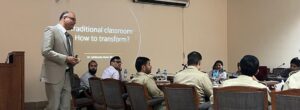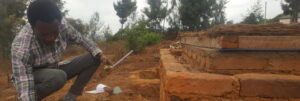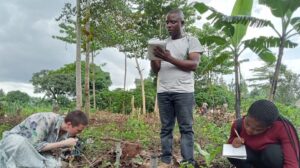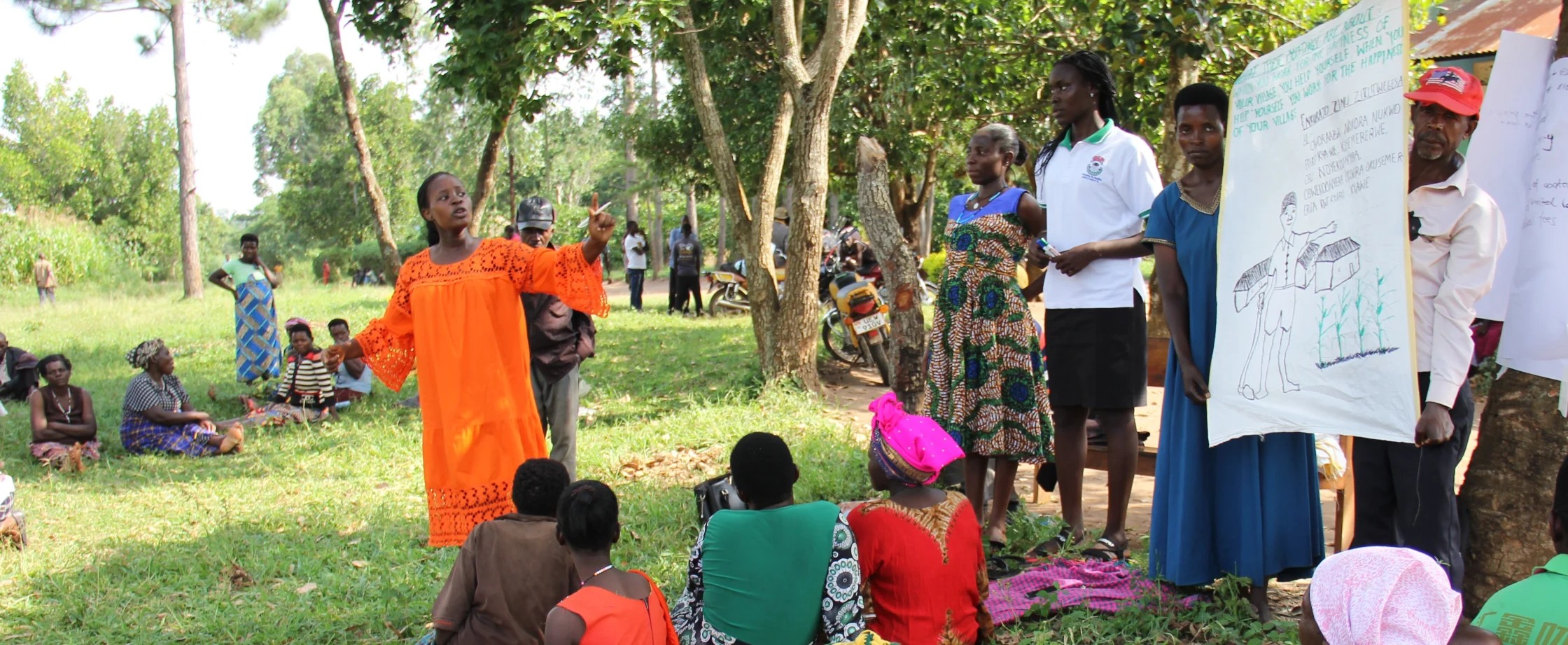
Open research starts with listening and learning
“We’ll be diverting from the normal desktop literature review and instead leave our office to listen to what the community is saying about the issues they are facing.”
Dr. Julius Huho, Garissa University
Stronger research starts with community voices
Evidence-based solutions, attuned to local contexts, are desperately needed to tackle the issues of today’s world, but research often begins with researchers setting the questions and reviewing the literature, isolated from the communities they aim to serve.
If research is going to change lives and livelihoods, it must consider not only the needs, but also the knowledge of local communities. Listening to the voices of community members and integrating indigenous knowledge at all stages of the research process can surface overlooked problems and build the trust necessary for research to have real-world impact that lasts.
INASP’s Digital Hub for Open Research in East Africa aims to equip early career researchers with the knowledge, skills and networks they need to support the health and wellbeing of their societies, economies and communities.
Thanks to funding support from the Templeton World Charity Foundation and embedded within INASP’s Rising Scholars community, the hub delivers an online learning programme, focused on open research practices. It aims to establish a digitally connected, East African rooted research community, that will grow to support 1000+ early career ‘open researchers’ over the coming years.
Developed and led by a global team, strongly rooted in East Africa, three ‘anchor partner’ institutions ground the work of the digital hub in their local contexts and complement the online training with more in-depth face-to-face learning.
Learning from fresh perspectives: introducing the Anchor Partners
In line with INASP’s commitment to supporting early career researchers in diverse locations, the three anchor partners are innovative universities situated in secondary cities and rural areas.
Already bringing fresh perspectives and alternative philosophies to addressing regional challenges, each of these institutions is uniquely positioned to drive impactful, community-focused research while fostering the growth of open research practices in underrepresented regions
- Garissa University is a public university in Garissa, Kenya. Its mission is to nurture talent through research, innovation, consultancy, community outreach, entrepreneurship, imparting knowledge and skills to meet the needs of society.
- The Nelson Mandela African Institution of Science and Technology (NM-AIST) is a public institution located in Arusha, northern Tanzania. It forms a part of the network of Pan-African Institutes of Science and Technology spread across the continent, and also takes a lead in community engagement as the host organisation of the Tanzanian Knowledge for Change (K4C) hub for the UNESCO Chair in Community Based Research and Social Responsibility in Higher Education
- African Rural University (ARU) is Uganda’s first all-women university, dedicated to rural transformation. Its distinctive education model blends academic study with extensive fieldwork, combining 60% theory and 40% practice. Over four years, students not only gain theoretical knowledge but also spend their final year living and working within rural communities, applying what they’ve learnt to local challenges.
Each of these anchor partners is embedding the hub’s training in their local contexts by asking communities what matters most and genuinely listening to the answers. Working side by side with communities is building trust and increasing the relevance of research. Integrating open research practices and participatory engagement into the earliest stages of project design allows researchers to improve the transparency, accessibility and usefulness of their work.
Garissa University: community voices reshape research priorities
Garissa University is a public institution in Garissa town, Kenya. As the first university in the country’s northern region to offer accredited degrees, it focuses on teaching, research, and community outreach, with a strong emphasis on technology, innovation and development.
To launch their involvement with the digital hub, the team organised a series of “hackathons” in Mwingi, Modogashe, and Bura. These events brought together community members to share their most pressing concerns, from water quality and land conflicts to flood mitigation and agricultural underdevelopment. Crucially, the discussions revealed rich indigenous knowledge about water management, often absent from formal research.
The team’s engagement was well received by communities who, having had less than positive experiences with university researchers in the past, appreciated being a part of the research process and having their voices heard when it came to issues about their own community.
For Dr. Julius Huho, the project lead, the impact has been transformative: “We’ll be diverting from the normal desktop literature review and instead leave our office to listen to what the community is saying about the issues they are facing.”
The university is now embedding these lessons into its research culture. Upcoming workshops will train staff in community engagement, open-source software, and preprint publishing, while connections with other open science initiatives are helping influence institutional policy. The team connected this project to work that other Garissa colleagues have been doing with The EU’s FOSTER Open Science programme and are hoping to use this collaboration to lobby university leadership to improve open research policies.
You can find out more on the university’s dedicated website for this work: http://openresearch.gau.ac.ke:82/index.html
Nelson Mandela African Institution for Science and Technology (NM-AIST): co-creating with local stakeholders
In Arusha, Tanzania, NM-AIST is building bridges between academia, industry and practitioners on the ground.
Through its ‘SEACOPEN’ (Strengthening Community Engagement and Involvement through Open Research in Northern Tanzania) initiative, the institution has partnered with local NGO Floresta Tanzania, which works with communities to reduce deforestation and poverty. NM-AIST launched SEACOPEN with two workshops, co-facilitated with Open Research Tanzania, focused on gender-responsive and community-engaged research, as well as deepening skills in open access publishing and data sharing.
“We’ve just concluded a highly engaging and insightful Training Workshop under the Digital Hub for Open Research in East Africa, hosted in Arusha from April 28–29, 2025. The workshop brought together a vibrant mix of participants, including early-career researchers, MSc and PhD students, and junior faculty members from NM-AIST and other higher learning institutions — all united by a common goal: to advance open research for climate-resilient development.”
Mwemezi Rwiza, Ph.D. Associate Professor, NM-AIST
Drawing on it’s engagement with a diverse group of stakeholders, including local NGO partners, NM-AIST has ensured its training responds directly to the needs and realities of local communities and those working alongside them. This alignment makes research more actionable and ensures that shared data is relevant and usable beyond academic circles.
African Rural University: research that serves the people who inspire it
African Rural University (ARU) is Uganda’s first all-women university focused on rural transformation. It blends academic theory with practical fieldwork to produce visionary female leaders to catalyse transformative change within the African context.
In May 2025, the university hosted an opening training session and launch event which was attended by over 100 participants, including ARU students, staff, and local officials. The INASP team facilitated a discussion about researcher needs at the event and discussions revealed a clear priority: researchers needed better skills to communicate their work openly, avoid predatory journals, and “package” findings for different audiences and community stakeholders, from local farmers to policymakers.
“As well as the official project launch, we’ve organised staff orientation, training workshops, and student engagement in community-based open research. The launch event, held on 2nd May 2025, attracted over 100 stakeholders, signaling strong institutional and community support. Ten lead researchers were selected and enrolled in the INASP Digital Hub, while 18 students began integrating open science principles into their fieldwork.”
Dr. Maali Chrispo, ARU
ARU is now developing workshops to integrate open research practices into student fieldwork, ensuring that graduates not only conduct rigorous studies but also share their findings in ways that communities can use.
With continued collaboration and institutional support, this project is well-positioned to deliver long-term impact in strengthening open research ecosystems in East Africa.”
Dr. Maali Chrispo, African Rural University
From access to engagement: what open research really means
Across these three institutions, it’s clear that listening before leading doesn’t slow research down – it makes it stronger. It ensures that findings are rooted in real-world priorities, that communities see themselves as partners rather than subjects, and that knowledge is both accessible and reproducible.
This approach reflects how the project understands open research: not only about access to data and publication, but about open engagement with society. In line with UNESCO’s Recommendation on Open Science, openness here means engaging communities, valuing indigenous and traditional knowledge systems, and ensuring that research contributes directly to social needs.
Creating space for dialogue and co-creation enablesresearchers to become leaders who are trusted not only for their expertise but for their willingness to hear and respond to the voices of others. Their research becomes community focused, locally relevant and globally significant.
The Digital Hub for Open Research in East Africa is generously supported by the Templeton World Charity Foundation, Inc.
Title image: students of African Rural University during a community participatory action planning meeting

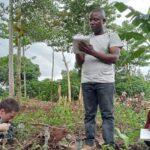 Previous Post
Previous Post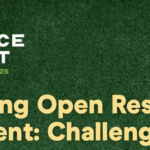 Next Post
Next Post